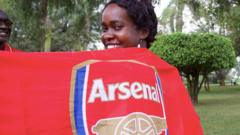Arsenal supporters in Uganda celebrate fiercely, but the passion sometimes turns violent, revealing the complexities of fandom in the East African nation.
**A Deep Dive into Uganda's Unyielding Arsenal Fanaticism**

**A Deep Dive into Uganda's Unyielding Arsenal Fanaticism**
Fans celebrate Arsenal’s Champions League success, highlighting a toxic rivalry and the intertwining of football and local culture.
In Uganda, the fervor for Arsenal Football Club ignites ecstatic celebrations, particularly after their recent 3-0 triumph over Real Madrid in the Champions League quarter-finals. Fans, clad in the club's iconic red and white, revel in victory outside video halls and bars, showcasing an unmistakable sense of belonging. This unyielding passion goes beyond mere sports enthusiasm, exemplifying how deeply ingrained football culture is in the fabric of Ugandan society.
While the nation is notable for its support of various English Premier League (EPL) teams, Arsenal and Manchester United dominate the fan scene. The palpable excitement around matches transforms even church services into fervent gatherings, where prayers are offered for the beloved Gunners. The sport has incited an entire retail industry, filled with shops selling memorabilia, as companies strategically capitalize on the football scene through advertisements linked to match outcomes.
Veteran sports journalist Isaac Mumema asserts that Uganda's football enthusiasm surpasses that of many African nations. The communal experience of viewing matches is central to the culture, drawing in crowds from even the most rural areas. Yet, this passion has led to troubling incidents. Football-related violence, primarily stemming from intense rivalries, has claimed lives in the past year. A tragedy struck in December last year when an Arsenal fan was shot during celebrations, escalating the violent nature that sometimes characterizes rivalries between clubs.
The strife is often exacerbated by gambling, as many fans stake their livelihoods on match outcomes. The rise of online gambling has further intensified this emotional investment, transforming joyous moments into aggressive confrontations when results sour. Some pundits argue that the demands of betting and the toxic atmosphere in bars contribute to the frequency of violent incidents amongst rival supporters.
As local sentiment shifts, the call for healing through community engagement becomes apparent. Football, rather than just a means of entertainment, has become synonymous with the harsh realities of life for many sports enthusiasts in Uganda. Encouraging fans to return to local games could reduce brawling while reviving the waning domestic league, which suffers from a lack of compelling star power.
Local sports advocates stress the need for increased visibility and support for the Ugandan league, which could help change the football narrative away from Western leagues and reintegrate communities into local sporting culture. Despite the pressures, As Solomon Kutesa, secretary of the Arsenal Supporters Club in Uganda, remains optimistic. With Arsenal positioned for potential Champions League success, he believes that the journey ahead could reshape the landscape for fans, uniting their passions while acknowledging the trials of their unquenched fervor for football.
While the nation is notable for its support of various English Premier League (EPL) teams, Arsenal and Manchester United dominate the fan scene. The palpable excitement around matches transforms even church services into fervent gatherings, where prayers are offered for the beloved Gunners. The sport has incited an entire retail industry, filled with shops selling memorabilia, as companies strategically capitalize on the football scene through advertisements linked to match outcomes.
Veteran sports journalist Isaac Mumema asserts that Uganda's football enthusiasm surpasses that of many African nations. The communal experience of viewing matches is central to the culture, drawing in crowds from even the most rural areas. Yet, this passion has led to troubling incidents. Football-related violence, primarily stemming from intense rivalries, has claimed lives in the past year. A tragedy struck in December last year when an Arsenal fan was shot during celebrations, escalating the violent nature that sometimes characterizes rivalries between clubs.
The strife is often exacerbated by gambling, as many fans stake their livelihoods on match outcomes. The rise of online gambling has further intensified this emotional investment, transforming joyous moments into aggressive confrontations when results sour. Some pundits argue that the demands of betting and the toxic atmosphere in bars contribute to the frequency of violent incidents amongst rival supporters.
As local sentiment shifts, the call for healing through community engagement becomes apparent. Football, rather than just a means of entertainment, has become synonymous with the harsh realities of life for many sports enthusiasts in Uganda. Encouraging fans to return to local games could reduce brawling while reviving the waning domestic league, which suffers from a lack of compelling star power.
Local sports advocates stress the need for increased visibility and support for the Ugandan league, which could help change the football narrative away from Western leagues and reintegrate communities into local sporting culture. Despite the pressures, As Solomon Kutesa, secretary of the Arsenal Supporters Club in Uganda, remains optimistic. With Arsenal positioned for potential Champions League success, he believes that the journey ahead could reshape the landscape for fans, uniting their passions while acknowledging the trials of their unquenched fervor for football.




















